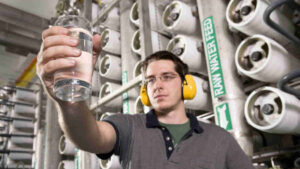Phoslock reckons the Chinese water dragon could turn it into a unicorn

Phoslock Environmental Technologies (ASX:PET) managing director Rob Schuitema wants to ride his Chinese dragon all the way to unicorn land.
In other words, he reckons the $298m company is on its way to becoming a $1bn company, on the back of some major Chinese deals.
“There are thousands of lakes that need Phoslock and we only need 10 of them to be a billion dollar company… and this current project is putting us well on the way to that,” he told Stockhead.
A ‘unicorn’ is tech speak for a billion dollar company, and Phoslock is one of the few ASX water stocks to be proving successful, using a phosphate-based water treatment to clean large bodies of water.
Yesterday, the company said a trial of its tech in Xingyun Lake in Yunnan province, China, resulted in a 75 per cent reduction of phosphorus in the heavily polluted waterway. It convinced Chinese authorities and as a result they’re getting a $1m trial deal out of it.
The lake is the size of about two-thirds of Sydney Harbour.
There are nine lakes in the area, all with legacy pollution problems. Chinese authorities have ordered an initial $1m worth of Phoslock’s ‘phoslock’ product and will check back in June to see how it’s going.
Schuitema says the Xingyun Lake is so large though, that even with $1m worth of product a month, the job will take four to five years.
Furthermore, he says if they can show Chinese authorities they can do a good job in one lake, they’ll likely get access to the other eight.
Water is a waiting game
Chaired by investor supremo Laurence Freedman, one of the pioneers of the investment management industry in Australia, it took Phoslock 16 years to hit profitability.
Cyan Asset Management’s Dean Fergie says that shows how long investors have to wait for results in the water sector.
“Like any of these newer formative engineering or environmental solutions companies, it just takes a long time for any of their IPs to get proven and then commercially adopted,” he said.
Stockhead monitors eight water-related stocks.
| Ticker | Company | Price May 23 | Market Cap | 1 Year return % |
|---|---|---|---|---|
| CG1 | CARBONXT GROUP LTD | 0.28 | $25M | -41 |
| CLQ | CLEAN TEQ HOLDINGS LTD | 0.305 | $235M | -74 |
| DEM | DE.MEM LTD | 0.105 | $12M | -25 |
| D20 | DUXTON WATER LTD | 1.52 | $170M | 44 |
| FLC | FLUENCE CORP LTD | 0.465 | $255M | 1 |
| PET | PHOSLOCK WATER TECHNOLOGY LTD | 0.55 | $298M | 86 |
| SDV | SCIDEV LTD | 0.081 | $9M | 45 |
| PO3 | PURIFLOH | 3.78 | $119M | 671 |
Puriloh (ASX:PO3) surged a whopping 334 per cent in a day after an American investor paid five-times the market value for stock, but the company is yet to repay that enthusiasm with a commercialised product.
In November last year it did speculate that first sales of its water treatment product could happen by September this year, but no further updates have been provided.
Duxton Water (ASX:D20) trades in water licences, and SciDev (ASX:SDV) is part water play, part precious metals play as its technology filters mining sludge for expensive minerals.
Fluence (ASX:FLC) is one company with reasonably new technology which it’s commercialising, but which is struggling to sell its story to investors.
Yesterday it also came within a whisker of a ‘first strike’ against its remuneration report as 22 per cent of shareholders voted against it.
A first strike is a warning; if 25 per cent of shareholders vote against the remuneration report for a second year, the whole board must put itself up for re-election.
- Subscribe to our daily newsletter
- Join our small cap Facebook group
- Follow us on Facebook or Twitter
Fluence more than tripled its full year revenue in 2018 to $101m but also more than tripled its full year loss, from $24m in 2017 to $77m in 2018.
It also booked a massive writedown on goodwill — the accounting term that puts a dollar figure on reputation — over the Israeli, Italian and ‘other’ businesses by $56m.
De.Mem (ASX:DEM) is also commercialising a very new water filtering technology, as explained here, and struggling to get traction with investors.
It has reasonably good numbers: in the March quarter it took $2m in customer receipts and cut cash burn to $600,000, before announcing water filtration contract wins worth $440,000 and another to deliver a $2.3m desalination plant.
The company upgraded its revenue forecast in May last year from $8-10m to $10-12m and in April it slashed the full year loss from $6.3m to $2m.
Investors declined to jump on board.
UNLOCK INSIGHTS
Discover the untold stories of emerging ASX stocks.
Daily news and expert analysis, it's free to subscribe.
By proceeding, you confirm you understand that we handle personal information in accordance with our Privacy Policy.








